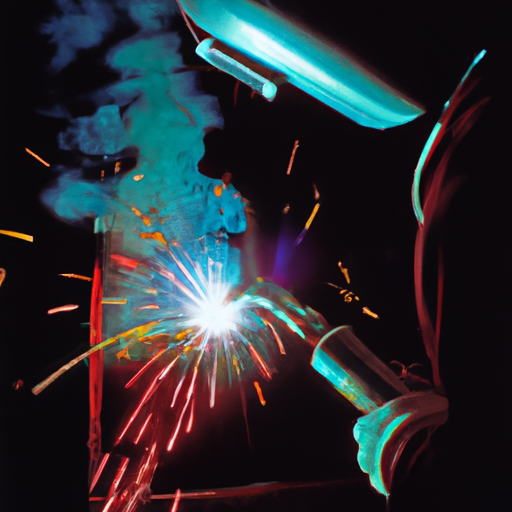Are you curious about which type of welding will earn you the most money? Look no further! In this article, we will explore the world of welding and uncover the highest-paying welding techniques. Whether you’re a seasoned welder looking to switch specialties or a beginner interested in the most lucrative path, we’ve got all the information you need to make an informed decision. Get ready to discover the welding techniques that could potentially boost your income and open up exciting new opportunities in your career. Stay tuned to find out which type of welding pays the most!
Overview of different welding jobs
Description of various welding jobs
When it comes to welding, there are a wide variety of jobs available. Each job has its own unique set of responsibilities and tasks. Some common types of welding jobs include structural welders, pipe welders, TIG welders, MIG welders, and underwater welders. Structural welders work primarily on building frameworks and structures, while pipe welders specialize in welding pipes and pipelines. TIG welders use a tungsten electrode to create high-quality welds, while MIG welders use a wire electrode to join metals together. Underwater welders, as the name suggests, perform welding tasks in water bodies like oceans and lakes.
Comparison of duties and responsibilities
The duties and responsibilities of a welder will vary depending on the specific job they have. Structural welders, for example, are responsible for reading blueprints, setting up welding equipment, and joining metal pieces together using techniques such as arc welding. Pipe welders, on the other hand, focus on welding pipes and ensuring proper alignment for efficient fluid or gas flow. TIG welders are skilled in precise welding techniques and are often responsible for welding delicate or thin materials. MIG welders, on the other hand, are known for their versatility and ability to handle larger projects. Underwater welders face unique challenges and are skilled in both welding and diving techniques to perform their tasks safely and effectively.
The Factors Influencing Welding Pay
Relationship between experience and pay
In the welding industry, experience plays a significant role in determining a welder’s pay. As a welder gains more experience and expertise, they often become more valuable to employers. This increased value typically results in higher pay rates. Experienced welders not only possess greater technical skills, but they also bring a wealth of industry knowledge and problem-solving abilities to the job.
Significance of certifications and specialized training
Certifications and specialized training can also greatly impact a welder’s pay. Welders who hold industry-recognized certifications, such as those offered by the American Welding Society (AWS), demonstrate their competence and dedication to their craft. These certifications validate a welder’s skills and can lead to higher pay rates. Additionally, welders who pursue specialized training in areas such as underwater welding or pipeline welding often have a competitive edge in the job market and can command higher salaries.
Role of shipbuilding, machinery production, and construction industry
The industry in which a welder works also influences their pay. Welders employed in shipbuilding, machinery production, and construction industries often earn higher wages due to the demand for skilled welders in these sectors. Shipbuilding requires welders with expertise in working with various types of metal and welding techniques. The machinery production industry relies on welders to construct and maintain heavy machinery and equipment. In the construction industry, welders play a crucial role in building structures and ensuring their structural integrity.

A closer look at Underwater Welding
Necessity and application of underwater welding
Underwater welding is a specialized field that combines diving and welding skills. It is necessary in various situations, such as repairing offshore structures, oil rig maintenance, and marine salvage operations. Underwater welders use specialized equipment and techniques to perform welding tasks in underwater environments. This type of welding requires a high level of precision and adaptability due to the unique challenges posed by working underwater.
Income potential of underwater welders
Underwater welding jobs command high pay rates due to the specialized nature of the work and the added risks involved. The scarcity of qualified underwater welders also contributes to their higher earning potential. Underwater welders often work in demanding conditions, including extreme depths and challenging underwater environments. Their ability to navigate these challenges while maintaining weld quality contributes to their higher pay rates.
Risks and challenges involved in underwater welding
Underwater welding presents several risks and challenges that make this job both demanding and rewarding. working in water bodies introduces hazards such as low visibility, potential for equipment failure, and exposure to underwater currents. Additionally, the welding environment itself can be treacherous, as welders must contend with high pressures and the presence of potentially harmful gases. It is crucial for underwater welders to undergo extensive training and possess the necessary qualifications to ensure their safety and the successful completion of their tasks.
Industrial Pipeline Welding jobs
Types of duties carried out by pipeline welders
Pipeline welders are responsible for constructing and maintaining the vast network of pipelines that transport oil, gas, and other fluids. Their duties include welding together sections of pipes, inspecting welds for quality, and ensuring the integrity of the pipeline systems. Pipeline welders must adhere to strict safety standards, as even the smallest flaw in a weld could have severe consequences.
Ways in which geographical location impacts earnings
Geographical location has a significant impact on the earnings of pipeline welders. Areas with a higher demand for skilled welders, such as regions with extensive oil and gas infrastructure, tend to offer higher wages. Remote or difficult-to-reach locations often require welders to have specialized training and certifications, leading to increased earning potential. Additionally, areas with a higher cost of living may offer higher pay rates to compensate for the increased expenses associated with residing in those locations.
Understanding why pipeline welding pays well
Pipeline welding pays well due to the specialized skills and qualifications required for the job. The construction and maintenance of pipelines are critical to many industries, particularly the oil and gas sector. The demand for skilled pipeline welders is high, and companies are willing to offer competitive salaries to attract and retain talented individuals. The importance of ensuring the integrity and safety of these pipelines further drives up the pay rates for pipeline welders.

Specialized Welding Jobs
Description of specialized welding jobs
Specialized welding jobs encompass a range of niche areas that require specific expertise and advanced skills. Some examples of specialized welding jobs include aerospace welding, nuclear welding, and robotics welding. Aerospace welders work on the fabrication and repair of aircraft components, ensuring they meet strict safety standards. Nuclear welders play a crucial role in maintaining the integrity of nuclear power plant components. Robotics welders operate and program automated welding systems, working alongside robotic equipment to perform precise and efficient welds.
Reasons for high pay for such roles
High pay rates for specialized welding roles can be attributed to several factors. Specialized welding jobs often require advanced knowledge and specialized training, which not all welders possess. The complexity and critical nature of the work also contribute to the higher pay rates. Welders in specialized roles are often responsible for maintaining precise tolerances, ensuring safety in sensitive environments, and working with cutting-edge technology. The limited pool of qualified welders in these specialties further drives up their earning potential.
Examples of specialized welding jobs
In addition to aerospace welding, nuclear welding, and robotics welding, there are several other specialized welding jobs. These include underwater pipeline welders, who perform welding tasks on pipelines located beneath the water’s surface. Pressure vessel welders work on the fabrication and repair of vessels that contain high-pressure substances. Cryogenic welders specialize in welding materials that are subject to extremely low temperatures. These specialized roles require specific skills and knowledge, making them highly sought after and well-compensated in the welding industry.
The Role of Qualification and Experience
Highlighting impact of qualifications on welding pay
Qualifications, such as certifications and specialized training, play a significant role in determining a welder’s pay. Welders who hold industry-recognized certifications validate their skills and expertise, demonstrating their commitment to their profession. Employers often value these certifications and may offer higher pay rates to certified welders. Specialized training, such as underwater welding or pipeline welding courses, can also contribute to increased earning potential by providing welders with niche skills that are in high demand.
How experience affects the salaries of welders
Experience is a crucial factor in determining a welder’s salary. As welders gain more experience, they become more proficient in their craft and develop a deeper understanding of welding techniques, materials, and industry practices. Experienced welders often bring valuable problem-solving skills and industry knowledge to the job, making them more valuable to employers. The demand for experienced welders is high, and companies are willing to offer higher pay rates to attract and retain seasoned professionals.
Typical career progression in the welding industry
In the welding industry, career progression often follows a pattern of increasing responsibilities and pay rates. Many welders start as apprentices, learning the trade under the guidance of experienced professionals. As they gain experience and develop their skills, they may advance to journeyman welders. Journeyman welders have demonstrated their competence and can work independently on a variety of welding tasks. With further experience and expertise, welders can progress to supervisory roles, quality control positions, or pursue specialized careers in areas such as inspection or engineering. The potential for upward mobility and increased earnings makes the welding industry an attractive career choice for many individuals.

Importance of Work Location
Ways in which geographical location affects pay
Geographical location has a significant impact on welding pay due to various factors. Areas with a higher cost of living often offer higher pay rates to compensate for the increased expenses associated with residing in those locations. Additionally, regions with a greater demand for skilled welders, such as those with booming construction or energy industries, tend to offer higher wages to attract and retain talent. Remote or challenging locations may also offer increased pay rates to compensate for the additional hardships and specialized training required.
Comparison of highest paying locations for welding jobs
Some of the highest paying locations for welding jobs include the Gulf Coast region of the United States, which has a robust oil and gas industry. Alaskan welders also command high pay rates due to the challenging working conditions and remote locations. Metropolitan areas with high construction activity, such as New York City or Los Angeles, often offer competitive salaries. Additionally, countries with significant infrastructure development, such as the United Arab Emirates and Australia, may offer attractive pay rates for welders.
Union vs Non-union jobs
Benefits of being in a welders union
Being part of a welders union can bring numerous benefits to professionals in the industry. Welders unions negotiate fair wages, benefits, and working conditions on behalf of their members. Unionized welders often have access to better healthcare coverage, retirement plans, and job security. Unions also provide opportunities for ongoing education and training, ensuring that their members stay up to date with industry advancements. Additionally, unions advocate for the rights of welders and provide a supportive community of professionals who can offer advice and assistance.
Difference in pay between union and non-union jobs
The pay rates for union and non-union welding jobs can vary. Unionized welders often enjoy higher wages and better benefits compared to their non-union counterparts. This is primarily because unions negotiate collective bargaining agreements that set minimum wage standards and other protections for their members. Non-union jobs may have more variability in pay rates, and welders may have to negotiate their own wages and benefits. While non-union jobs can sometimes offer higher pay than unionized positions, they often lack the same level of job security and comprehensive benefits.

Military Support Welding Jobs
Description of military welding jobs
Military welding jobs involve providing welding support to defense operations and military installations. These welders play a crucial role in maintaining military equipment, vehicles, and structures. Military welding jobs can be found in various branches of the armed forces, including the Army, Navy, Air Force, and Marine Corps. Welders in the military undergo specialized training to ensure they meet the high standards required for military operations.
Understanding the compensation for military welding jobs
Compensation for military welding jobs varies depending on factors such as rank, years of service, and job responsibilities. In the military, welders receive a base pay, which increases with higher ranks and years of service. In addition to base pay, military personnel may also be eligible for various allowances, such as housing and food allowances. Benefits such as healthcare and retirement plans are also provided to military personnel, making military welding jobs a comprehensive package of compensation and benefits.
Outlook for Future of Welding Jobs
Predicted trends in the welding industry
The welding industry is expected to experience several trends in the coming years. One notable trend is the increasing use of automation and robotic welding systems. As technology advances, automated welding systems are becoming more prevalent, leading to changes in the job market. Welders who can adapt to and work alongside these systems will likely have better job prospects and opportunities for career advancement.
Expected changes in pay for welding jobs
The pay for welding jobs is influenced by various factors, including economic conditions, industry demands, and technological advancements. As specialized skills become increasingly in demand, wages for welders with niche expertise may rise. However, the automation of certain welding tasks may lead to changes in pay for some positions. Welders who possess a strong understanding of automation technologies and can complement them with their skills are likely to remain in high demand and command higher pay rates.
Potential impact of technology on welding jobs
Technology is shaping the future of welding jobs. Automated welding systems and robotic machines are increasingly being used to perform repetitive and precise welding tasks. While this may reduce the need for traditional welding roles in some areas, it also creates opportunities for welders to specialize in programming, operating, and maintaining these robotic systems. Adapting to technological advancements and acquiring relevant skills can help welders stay relevant and thrive in the changing landscape of the industry.
In conclusion, there is a wide range of welding jobs available, each with its own set of duties and responsibilities. Factors such as experience, certifications, industry demands, and geographical location play a significant role in determining welding pay. Specialized welding jobs often offer higher pay rates due to the unique skills and knowledge required. Unionized welders tend to enjoy better wages and benefits compared to non-union positions. Working in military welding jobs provides a comprehensive compensation package along with the opportunity to serve in defense operations. As the welding industry evolves, embracing technological advancements will become crucial for welders to remain competitive and adapt to changing job demands.

